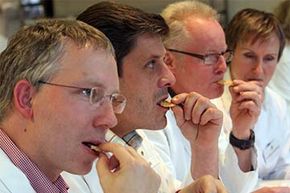How'd you like to eat chocolate for a living? Or curly fries? You could if you're a professional food taster. The job sounds so appealing: Eating your must-have food as much as you want! That's not quite how professional food tasting works, however. While tasters definitely evaluate how delectable a product is, they're also scrutinizing how it looks and smells, plus considering its consistency and innumerable other factors.
And contrary to what some believe, they're not making meals out of the foods they're tasting, either. Taste-testers take small bites of a particular food, which allows them to truly evaluate its various components. Then they spit it out and cleanse their palate in preparation for the next sample by sipping water or perhaps even gargling.
Advertisement
There are two basic types of food tasters: The first group consists of professionally educated and trained men and women who are often employed as food technicians, food scientists or product developers. The second type comprises consumers who work part-time or on an as-needed basis to taste-test products for companies. The former group samples food as one part of their job, while the latter group is only involved in taste-testing.
Ice cream producer Ben & Jerry's has professional tasters on staff, dubbed "flavor gurus" who create new ice cream flavors. Most of these gurus have backgrounds in food science or as chefs. Meanwhile, the Schwan Food Company, which is based in Marshall, Minnesota, and sells frozen foods through home delivery and grocery stores, invites people living near company headquarters to become paid taste-testers. They sample current and new products in its "sensory tasting laboratory" and provide feedback. All potential tasters have to do is fill out a form with basic demographic information and food preferences and they'll be notified when tests are available.
In between these two extremes are firms like MMR Research Worldwide that conduct consumer and sensory market research for companies in the food, drink and personal care sectors, including Dunkin' Donuts, Unilever, Barilla and Kellogg's. MMR hires "sensory panelists" to taste-test part time on a fixed schedule, first putting them through extensive training. No particular education or experience is needed for the job, but the MMR website says that "candidates should have good sensory acuity (this will be tested at a screening session), and have the ability to articulate themselves in front of others."
So what is sensory acuity, and how do you know if you have it? Find out on the next page.
Food taster FAQ
What is a professional taster?
What does a food taster do?
How do I become a food taster?
What education do you need to be a food taster?
How much do food tasters make?
Please copy/paste the following text to properly cite this HowStuffWorks.com article:



